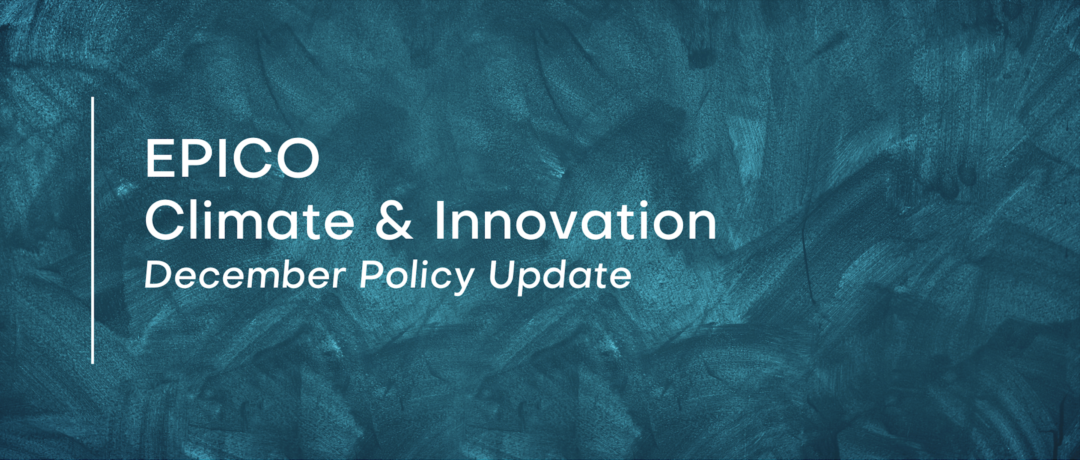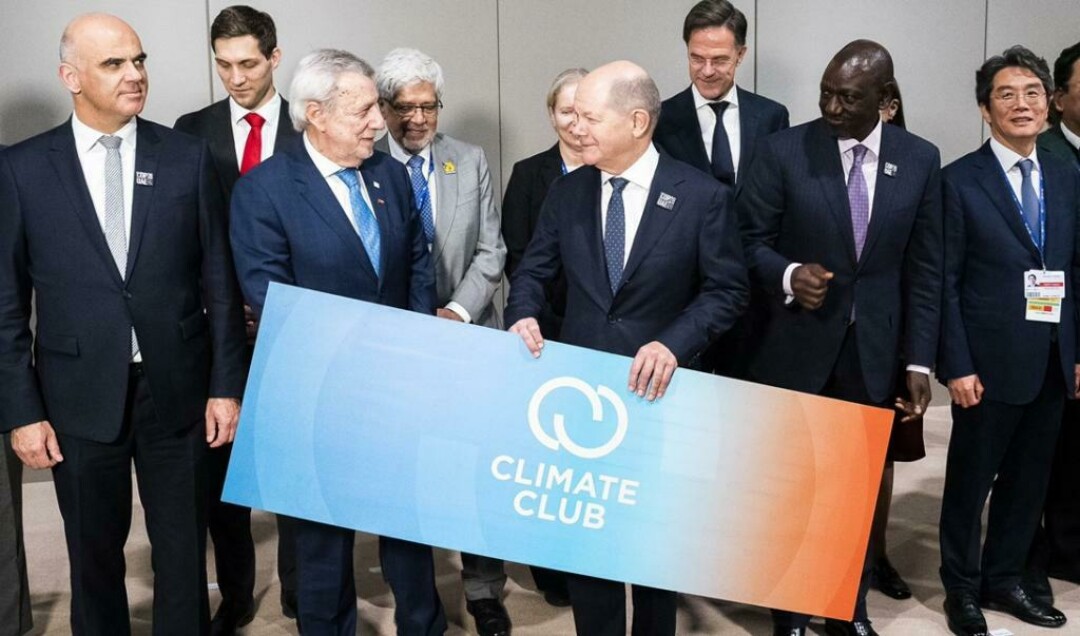
A Global Focus: Climate Club@COP28, Hydrogen Partnerships, CCS Wins
EPICO KlimaInnovation is a non-profit and independent energy and climate think tank providing a platform, database and network for policy development. In our monthly policy update, we dive into the latest and most relevant developments in energy and climate policies, and share the outcomes of our events and publications.
Climate Club Launch @ COP28
On December 1, co-Chairs Germany and Chile launched the Climate Club at COP28. The format already includes 36 countries as members. In short, it is an intergovernmental forum for exchange on industry decarbonization and increased cooperation.
On November 27, EPICO and the Konrad Adenauer Stiftung published the Policy Brief “ Piloting the Climate Club in the Steel Sector: Focus on the Quick Wins, Create a Safe Space for Dialogue ” . The paper, authored by EPICO's Senior Policy Specialist Parul Kumar, Heiner von Luepke (DIW), Max Åhman (Lund University), Simon Otto (VUB), Samuel Flückiger (thyssengroup), and Åsa Ekdahl (World Steel Association), provides a set of guidelines to the Climate Club to kickstart its work in the steel sector.
On November 30, the Chilean co-Chair joined our event " Building blocks for an industrial agenda towards climate neutrality " with Francisco Javier Ulloa Muñoz (Embassy of Chile to Germany), key to the design of the Climate Club's work, together with Marzena Rogalska , Clara Brundi , and Natalie Weiß (IDOS).
Authors underlined the need to build trust and secure wins between countries in the Global North and the Global South to promote steel sector decarbonization and to pave the way to create a safe space for dialogue on contentious issues in the steel sector.
Parul Kumar's key takeaway?
Focusing the Climate Club on Carbon Pricing and Carbon Leakage is imprudent, and could lead to impass, Jeopardizing the Climate Club's International Cooperation in the Steel Sector.

Harnessing the EU's Hydrogen Global Partnerships
In the run-up to COP, EPICO continued its activities on pushing EU action in international partnerships. On 7 December, the European Parliament's DEVE Committee voted in favor of amendments coming from contributions we have provided for the INI report on “The EU development cooperation in support of access to energy in developing countries”. Our input on the report derives from the extensive work EPICO has devoted to the topic for the last years.
On November 11, we unveiled four policy briefs in collaboration with the Iberdrola Energy and Climate Chair at College of Europe Dirk Buschle and the College of Europe's Students' Energy Group. The publication stems from our joint call for papers open to diplomats from the European Diplomatic Academy and alumni and students of the College of Europe. The project's winning authors Stefanie Schäfer, Jonas Meuleman, Anna-Loreen Mondorf, Ana Valverde Serrano, Marco Valenziano outline roadmaps to develop a comprehensive EU hydrogen diplomacy with Africa and the Middle East, paving the way for a just and sustainable transition in the region.
On 30 November, on the occasion of our annual flagship event “ Building blocks for an industrial agenda towards climate neutrality ” , EU Policy Manager Sam Williams and Yana Zabanova (RIFS) presented our recently published policy brief “ EU-Kazakhstan Green Hydrogen Partnership: Mapping Barriers and Establishing a roadmap ”. Nicholas Pomeroy (Anglo-Kazakh), Holger Klitzing (Germnay's Federal Foreign Office) and Rainer Quitzow (RIFS) joined the authors to provide their input on the water issue, energy efficiency and strategic nature of Kazakhstan as an energy partner.
On November 12 and 13, at a crucial time for Argentina's future, our EU Policy Manager Sam Williams was hosted in Buenos Aires by Fundación Konrad Adenauer Argentina, Latin American Senators and MPs to talk about Green hydrogen, and the EU's planned and current policies to kick-start a domestic and international market. Only a few weeks after European Commission President Ursula Von der Leyen signed an MoU on hydrogen with Argentina, Sam joined a panel with Costa Rican Congresswoman and President of the Energy Committee Daniela Rojas, heloisa schneider, Nicolás Vásquez, and Annika Klumpto talk about EU- Latin American hydrogen relations.
Sam Williams' key takeaway?
EU Green Hydrogen partnerships are essential to support the decarbonization of third countries' key industrial sectors, adding value to local communities and implementing global standards.
Germany's Puzzle to define a CCS Strategy
On December 7, the Council of the European Union voted on a general approach to the Net-Zero Industry Act (NZIA): a key step for carbon capture and storage policy in the EU. Member States agreed on an EU CO2 storage target of 50 million tons per year by 2030, an obligation on oil and gas producers to store CO2, enhancing data on geologic storage, speeding up infrastructure permitting and including CO2 transport infrastructure.
On December 2, we published the policy brief “CCS and Climate Neutrality: Developing a Pathway for Germany” with the Konrad-Adenauer-Stiftung . On November 30, authors and guest speakers, including EPICO's Energy Policy Specialist Maximilian Lauer, Eadbhard Pernot (CATF), Luisa Keßler (BELLONA), Matthias Poralla (Perspectives Climate Group), Martin Schebesta (KAS), Christoph Reißfelder (Covestro), Johanna Kemper (Wintershall DEA), Felix Schenuit (SWP), jointly discussed the findings on the occasion of our event “Building blocks for an industrial agenda towards climate neutrality”.
Authors emphasized the need for a comprehensive and positive narrative on CCS, highlighting its role in limiting difficult-to-reduce and unavoidable emissions, drawing on scientific evidence and carefully considering stakeholders' concerns. Another focus is overcoming legal and regulatory bottlenecks to facilitate the development of CCS projects. This includes the creation of a national legal framework, access to storage sites in Germany and the promotion of CO2 infrastructure.
The cluster strategy for CCS development aims to identify and develop CCS hubs to enable economies of scale in CO2 infrastructure. Europe must change public perception from "not under my backyard" to "yes under my backyard". Local communities should be involved, and local economic incentives for CCS projects should be prioritized. The policy brief aims to contribute to the German government's CCS strategy, to be issued in the upcoming weeks.
Maximillian Laurer's key takeaway?
CCS is essential to reduce unavoidable emissions. Clear political support, based on scientific evidence and considering stakeholder concerns is of essence to gain public support and encourage the implementation of CCS projects.
Germany's energy price package deadlock
On November 9, Germany finalized its decision on the industrial power price saga, the “Energy Price Package” . But the following week a Federal Constitutional Court ruling threatened the financing of the measure, leading to a de facto stalemate. EPICO hosted a panel discussion, "What industrial electricity price does Germany need?" , discussing the compromise package with Dr Lukas Köhler (MP, FDP), Dr. Philipp Beckmann, Dr. Maximilian Rinck, Martin Theuringer and our CEO Dr. Bernd Weber.
The discussion focused on critical aspects of the future development of Germany as an industrial location, particularly against the backdrop of rising electricity costs. Speakers call for forward-looking strategies to shape a sustainable energy future. In addition to highlighting the need for long-term visions, concrete steps and implementation scenarios were discussed in depth to effectively address the industrial electricity price challenge.
Going forward, the German Platform on Carbon Neutral Electricity Design will be working Berlin out of the stalemate, and German parties are soon to engage in negotiations to come up with a common strategy.
Dr Bernd Weber's key takeaway?
We have to have a proper discussion on what to do in the short-term, and what we need to work on in the medium-to-long term to boost ppas and incense flexibility.
EPICO is growing!
Come from our Brussels office to say hi to our new EU Policy Specialist (Industrial Decarbonization) Julian Parodi! Julian will boost our work on policies related to EU industrial decarbonization, including the deployment of renewable energy and a more circular economy, with a keen focus on the steel sector.
Apply to become our Senior Policy Specialist Industry and Energy

